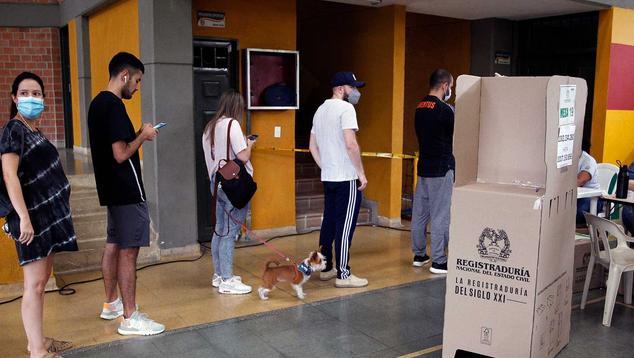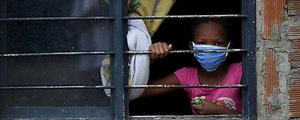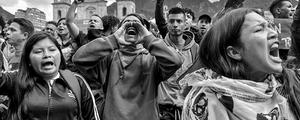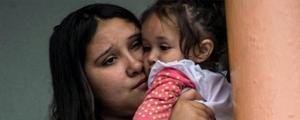Story Highlights
- 56% of the poorest 20% of Colombians say local economies getting worse
- 39% of the richest 20% of Colombians say local economies getting worse
- 80% say corruption is widespread in the government
WASHINGTON, D.C. -- Colombians vote in the second round of their country's presidential election on Sunday, when they will choose a new president from either the political left or right.
Each of the candidates is promising change -- which largely explains their appeal and why they ended up on the ballot. Gallup surveys in Colombia ahead of the election show people are largely fed up with the status quo and the direction of their economy, and there is a wide divide between the poorest and wealthiest Colombians.
Quick Summary: In the first round of the presidential election on May 29, Colombians whittled the candidates to two, Gustavo Petro and Rodolfo Hernández. Both candidates have been characterized as "populists," though they each represent opposite ends of the political spectrum.
Petro is a leftist former mayor of Colombia's capital, Bogota, and a former member of a guerrilla group. Much of Petros' campaign has focused on policies intended to redistribute wealth among Colombia's population, with an emphasis on taxing wealthy Colombians and providing jobs to the poor. Additionally, Petro has promised to reform the country's police force and transition the economy away from fossil fuels.
Alternatively, Hernández is the former mayor of Bucaramanga, Colombia, and a millionaire real estate developer who has run on using his business talent to help improve the Colombian economy. Hernández has appealed to conservative-leaning Colombians with economic policies that would include lowering taxes and curtailing government spending on various social programs.
Additionally, Hernández has promised to tackle government corruption. He has been building alliances with Colombian political groups and leaders concerned about Petro's guerilla past and left-wing leanings.
Nearly Half of Colombians See Economy Headed in Wrong Direction: In 2021, Colombians were largely divided on the state of their local economies: 46% of Colombians said they were getting worse, while an equal percentage said they were getting better. That level is essentially equal to Gallup's record-high measure of 47% in 2017 and 2019.
In 2015, declining prices of two key exports, oil and gas, hurt Colombia's economy, and it had not recovered by the time the COVID-19 pandemic hit hard in 2020. Since 2016, at least 41% of Colombians have consistently said their local economies are getting worse.
Economic pessimism is most pronounced among poorer Colombians; 56% of those in the poorest and second-poorest household income groups say their local economies are getting worse. This is compared with the richest Colombians, those in the top 20% of household income, among whom 39% say their local economies are getting worse.
Previous Gallup research has found additional evidence of economic pain among the Colombian public, with 60% finding it difficult to get by on their current incomes in 2021 and more than half, 52%, saying they had lacked money for food in the previous 12 months.
Most Colombians Consistently Say Corruption Is Widespread in Their Government: In addition to economic discontent, Colombians also consistently see their government as riddled with corruption. In 2021, eight in 10 Colombians said corruption was widespread in their government, while 16% said it was not. At no point in Gallup's trend since 2006 have less than 70% of Colombians said corruption was widespread in their government.
As with the differences in views of the local economy, Colombians' perceived level of government corruption varies by household income. Among the poorest 20% of Colombians, 69% say corruption is widespread in government. This rises to more than eight in 10 among Colombians in the middle to richest 20%.
Colombians' negative views of their government also extend to their views of the honesty of elections in their country. In 2021, 77% of Colombians said they were not confident in the honesty of the country's elections. This is on the higher end of Gallup's trend but still below the high of 85% in 2015, which came after the presidential election the previous year. Allegations of irregularities and errors in vote counting for the country's senatorial elections in April of this year likely did little to improve Colombians' views of the honesty of their elections.
The lack of faith in the honesty of elections may contribute to the generally low level of participation, with less than half, 46%, of eligible voters in Colombia casting ballots on average. However, in the first round of the current election, a record 54.9% of Colombians cast ballots, likely reflecting a higher level of enthusiasm for the candidates. Participation in the second round of voting may be down from this record high, as several candidates were knocked out, and their supporters may choose not to take part.
Unlike assessments of the local economy and corruption in government, there is relatively little difference in confidence in the honesty of elections among the various household income groups in Colombia.
Implications
The results of the first round of the Colombian presidential election clearly showed Colombians' strong desire for change, with Federico Gutiérrez, a candidate largely seen as linked with the current president, failing to advance to the second round. The two candidates that did advance, Petro and Hernández, are both seen as anti-establishment and a rejection of the current president's policies. Petro, in particular, would be a break; if elected, he would be Colombia's first leftist president.
Whoever wins the election, Colombia faces a host of daunting challenges, and enacting sweeping policy changes will likely prove difficult. With both candidates promising change, there will likely be a brief honeymoon period where public sentiment will be more positive. However, without fundamental improvement of the country's economy and reform of the government, increased public optimism may not last.
To stay up to date with the latest Gallup News insights and updates, follow us on Twitter.
For complete methodology and specific survey dates, please review Gallup's Country Data Set details.




